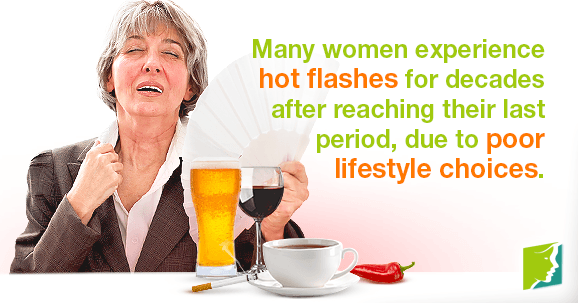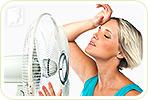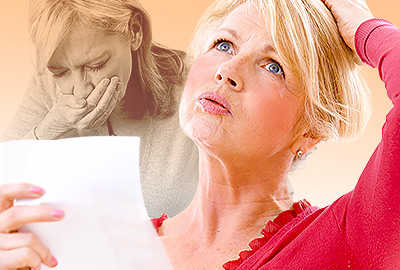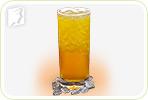Hot flashes are one of the most common symptoms of menopause, and the majority of women will experience at some point. They can be exhausting to have to face because of the increased heart rate and excessive sweating. The worries as to when they will come can disrupt your daily routine can make it difficult for you to be as productive as you can be in your professional and personal life. You may feel stuck in a body that just can't seem you cool down and wonder when it all will end.
Typical End Point
Hot flashes typically begin during perimenopause, the stage leading up to menopause, and ends about one year after your last period. This is because it is during perimenopause, when symptoms arise as a result of shifting and declining estrogen levels. As your body adjusts to the change, it tends to even out and function as usual, since hormone levels no longer fluctuate so drastically after menopause. Your hypothalamus will often not be as thrown off by the reduced estrogen.
Reality
The reality is that many women not only experience hot flashes long before menopause is on the horizon, but they can get attacks decades after their last period. This is often due to poor lifestyle choices. Since estrogen has mostly evened out, albeit a lower level, it will likely not be the root cause of flashes anymore. When you keep active, relaxed, eat well, and consume herbal remedies, it can help you find peace.
Causes for Hot Flashes
First, it is important to understand the causes for your hot flashes, as they will determine the answer to this slightly vague question. One of the causes is a drop in estrogen levels. When this happens during menopause, the hypothalamus is cued and raises your body temperature. There are also lifestyle causes, such as smoking, excessive drinking, caffeine intake, and spicy foods, which are known to cause panicky hot flashes. Finally, there is stress. Anxiety can double the severity of hot flashes and is often due to lack of relaxation and physical activity throughout the day.
Possible Solutions
The number one solution is to reduce stress in your life. When you do not know how to cope with hot flashes, they can feel far more intense. Practice 15 minutes of deep, full breathing every day to relax, re-center, and cool down. Close your eyes, put on ambient music, and let go of worries.
Alternative solutions, regarding the estrogen dilemma, are phytoestrogenic herbs. Whether in supplemental or tea form, herbs such as black cohosh and dong quai will restore estrogen and thereby help regulate body temperature. Finally, avoid the above mentioned triggers. Opt for spice-free foods, and eat a well-balanced, colorful diet of fruits, vegetables, whole grains, and lean proteins.
Unfortunately, there is no straight answer to when hot flashes stop. Every woman's body responds very differently to fluctuating hormone levels. You do have a level of control over when exactly hot flashes will cease, as long as you avoid triggers and lead a healthy lifestyle.
Sources
- Carmody, J. , Crawford, S. & Churchill, L. (2006). A Pilot Study of Mindfulness-based Stress Reduction for Hot Flashes. Menopause, 13(5), 760-769. Retrieved from http://www.ncbi.nlm.nih.gov/pubmed/16932242
- National Institutes of Health. (2012). Dong quai. Retrieved March 12, 2014, from http://www.nlm.nih.gov/medlineplus/druginfo/natural/936.html
- Office of Dietary Supplements. (2008). Black Cohosh. Retrieved March 12, 2014, from http://ods.od.nih.gov/factsheets/BlackCohosh-HealthProfessional/
- Schilling, C. et al. (2007). Current Alcohol Use, Hormone Levels, and Hot Flashes in Midlife Women. Fertility and sterility, 87(6), 1483-1486. doi: 10.1016/j.fertnstert.2006.11.033
- Sood, R. et al. (2013). Paced Breathing Compared with Usual Breathing for Hot Flashes. Menopause, 20(2), 179-184. doi: 10.1097/gme.0b013e31826934b6
- Whiteman, M.K. et al. (2003). Smoking, body mass, and hot flashes in midlife women. Obstetrics and Gynecology, 101(2), 264-272. Retrieved from http://www.ncbi.nlm.nih.gov/pubmed/12576249




